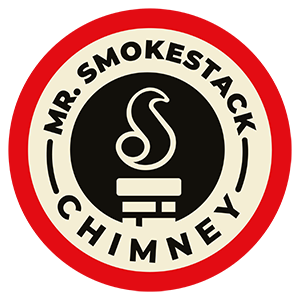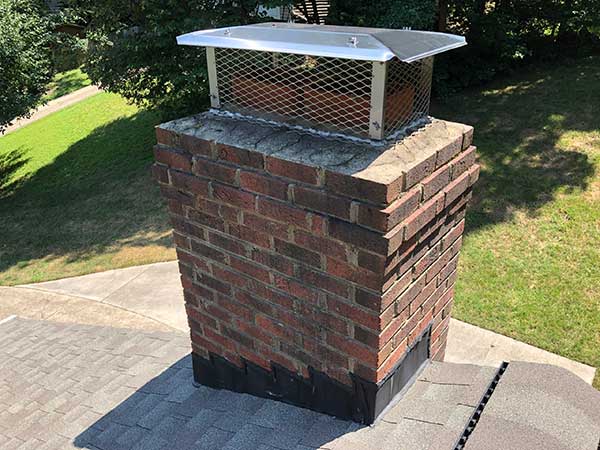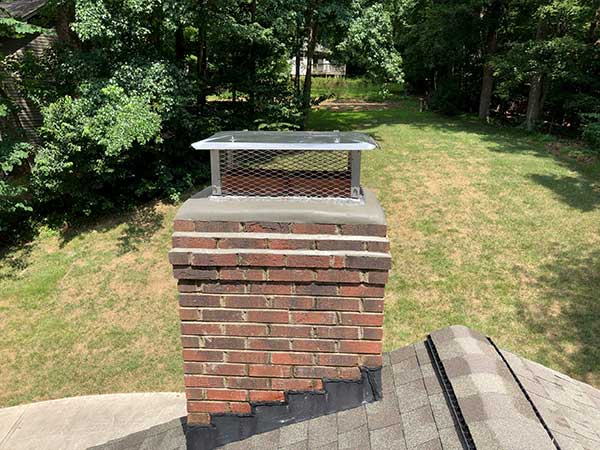Leaky Chimney in Durham, Raleigh, Greensboro, or Somewhere Near? Call Mr. Smokestack Chimney Service Today
You’ve stocked up on water and food, the first-aid kit is ready to go, and all of the flashlights have fresh batteries. A big thunderstorm is in the forecast, but you’ve taken all of the necessary precautions. Then it happens – the rain kicks into high gear and you notice water spots around your chimney. Your chimney has sprung a leak.
When water or moisture gets into your chimney, it can cause a wide range of serious problems. Water will bring even the most well-built chimney to its knees, causing cracked mortar and flaking bricks, and compromising its structural integrity.
If you’re a resident of Broadway or Raleigh, Mr. Smokestack Chimney Service is here to help you out. We will pinpoint the origin of your chimney leak and get it patched up in no time. Schedule an appointment with us online or call us at 919-747-1859.
What Are the Most Common Causes of Chimney Leaks?
There isn’t a singular cause of chimney leaks. Chimneys are large, complicated systems and many of their parts can be the source of your problem. The most common causes of leaks that we see in our line of work include:
- There’s an issue with the chimney cap. The chimney cap covers the opening of the flue and plays a vital role in the battle against water entry. If it gets damaged or doesn’t fit right, your chimney is bound to take in the some water, causing your liner, firebox, and more to suffer.
- The crown is cracked. The chimney crown is a block of concrete that slightly overhangs the edges of your chimney and directs water away from the masonry. In the past, crowns were made with mortar or a combination of concrete and mortar – neither option holds up very well. A crown replacement may be needed if there are a lot of cracks or if they’re very large.
- The flashing is damaged. Chimney flashing is the metal sheeting that seals the area between the chimney and the roof. If the flashing is improperly installed or damaged, it can allow water to seep in and cause leaks.
- You need a chimney cricket. The area where the chimney and roof meet is especially vulnerable to water penetration. If your chimney is more than 30 inches wide, you should ask your chimney technician about a chimney cricket – a metal or wood-framed miniature peaked roof that sits behind your chimney.
- There’s a problem with the masonry. Masonry materials, like bricks and mortar, can deteriorate after a while due to exposure to the elements. Cracks in the chimney’s masonry can provide easy routes for water to enter.
- The freeze/thaw cycle. Your chimney sticks up above the roof and is constantly exposed to the elements – wind, snow, rain, and the freezing/thawing cycles of winter. Masonry materials are very porous, so they absorb a large amount of water. The constant cycle of freezing and thawing puts a large amount of stress on the chimney, leading to cracking, chimney leaks, and structural damage.
- The flue liner is missing or damaged. The chimney liner helps direct moisture away from the flue’s interior walls. Chimneys without liners or liners with damage are more susceptible to water penetration.
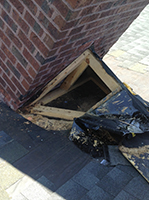
Flashing Problems
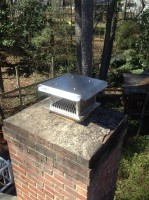
Damaged/Defective Chimney Crowns
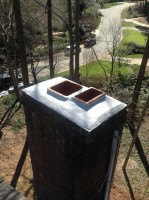
Missing/Defective Chimney Caps
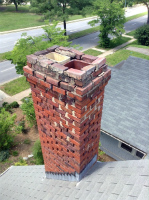
Cracks/Gaps in the Mortar Joints or Chimney Masonry
Is It Normal for Chimneys to Leak During Heavy Rain?
It’s definitely not normal for a chimney to leak during a heavy rainstorm – or at all, for that matter.
A properly built and well-maintained chimney should be able to withstand heavy rain without allowing water to enter your home and cause damage. Even if it only happens once during a particularly bad downpour, you shouldn’t overlook it. Even just a single isolated incident is one too many.
Get in touch with Mr. Smokestack Chimney Service to schedule an appointment. Chimney leaks can be difficult to locate, but our crew of certified chimney technicians is trained to zero in on areas of concern. Call us now at 919-747-1859 or book with us online.
What Are the Signs of a Leaking Chimney?
You could have a water entry problem in your chimney long before you see signs of it. In fact, it’s not out of the ordinary for water damage to be found during a chimney inspection. But if you happen to notice any of the following, there’s a high likelihood that there’s a leak somewhere in your chimney system:
- You can see water stains. Check the ceilings and interior and exterior walls near your chimney for water stains. Stains may be brownish or have a yellowish tinge and may spread over larger areas over time.
- There’s an odor. A musty or damp smell around your fireplace or chimney could be due to the presence of mold and mildew. The growth of mold and mildew is usually a key indicator that there’s a moisture problem.
- Masonry is deteriorating. Crumbling or flaking masonry on the chimney’s exterior can be a sign of water damage. Pay attention to the mortar between the bricks or stones, as gaps in the mortar are a sign that the masonry is taking on too much water.
- You see efflorescence. Efflorescence presents itself as a white, chalky coating on the chimney’s exterior. It happens when water penetrates the masonry and brings minerals to the surface as it evaporates.
- There’s rust and corrosion. There are a lot of parts in your chimney that are made of metal. Rust on the cap, damper, fireplace doors, or flashing suggests water is getting into the system. Rust can also cause red stains to form on the areas around those components.
- There’s water damage inside of your home. Water stains, peeling wallpaper, and disintegrating drywall are often symptoms of a water leak. If this damage is limited to the area around your chimney and fireplace, your chimney is the likely culprit.
- There are dripping sounds. Your chimney shouldn’t make much noise. Keep an ear open for sounds of dripping water that get worse during or after rain.
- You have leaks in your attic or crawlspace. These spaces in your home may not be easy to access, but if you can, check them for signs of water damage near the chimney. This could include damp insulation, wet wood, or mold growth.
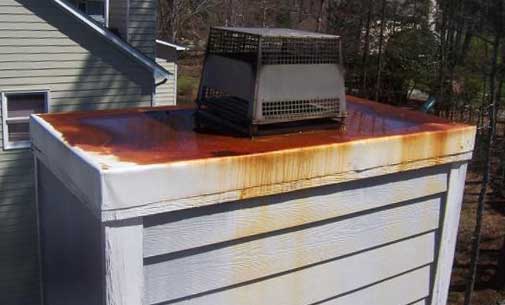
Before
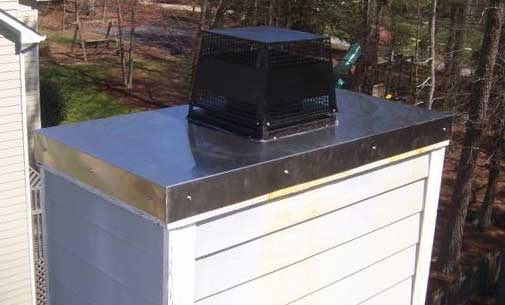
After
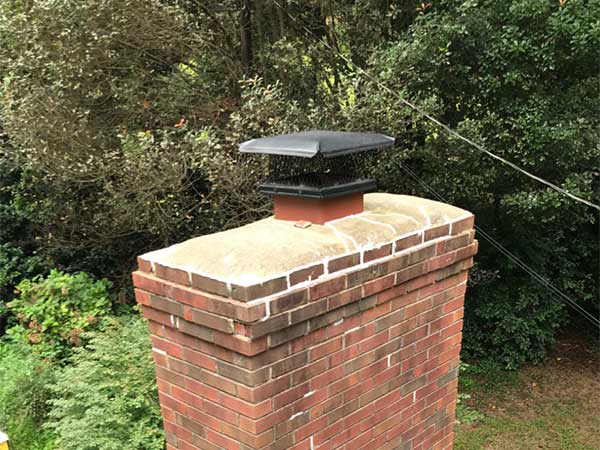
Before

After
What Is Chimney Waterproofing & Why Is It Important?
Professional chimney waterproofing is vital in protecting your chimney against water. It involves using an industry-grade, vapor-permeable waterproof sealant to coat the exterior of the chimney, creating an impenetrable barrier against rain, snow, sleet, and any other watery element that can harm your chimney.
At Mr. Smokestack Chimney Service, we only use the best water sealants on the market. All of our chimney technicians are highly skilled and trained in applying these agents. If you have questions about our line of products, feel free to contact our customer service team.
Is waterproofing only for masonry chimneys?
Most people only think of waterproofing when it comes to traditional brick and mortar chimneys, but waterproofing is also a good way to go if you’re the owner of a prefabricated chimney. Prefab units feature several metal components and rust can become an issue. You can never have too much protection against water.
How long does chimney waterproofing last?
In general, the longevity of waterproofing can vary depending on factors, such as the product used and your area’s weather conditions. On average, you can expect to reapply waterproofing every 10 to 20 years. If you live in an area that gets a lot of rain or is at risk for a potential hurricane (like here in North Carolina), you may have to waterproof more often.
Can I Repair a Chimney Leak Myself?
We completely understand homeowners who want to take home repair matters into their own hands. Doing repair work by yourself could be cheaper than hiring a professional and you can save time by working at your own pace, since you don’t have to worry about scheduling appointments… But is that really true?
Our chimney technicians are certified by the Chimney Safety Institute of America (CSIA) and are experts in locating and resolving chimney leaks. If you don’t know exactly where to look or what areas need a little more attention, you could completely miss the cause of your chimney leak.
Let’s say you think the culprit is a crack in your chimney crown, but you don’t see that a section of your flashing is also damaged. You’ve only addressed a part of the problem and given water more time to get into your chimney. It’s a scenario that is easily avoidable by calling in a professional from the beginning.
In addition to all of that, doing work on top of a roof is dangerous if you don’t have the right equipment. Our chimney professionals have all of the equipment and training to complete chimney repairs safely. Don’t risk an injury over a chimney leak – we’re here to do the hard work for you.
Are Chimney Leaks Covered by Homeowners Insurance?
If you have homeowners insurance, you may be eligible for coverage if you have a chimney leak. It ultimately depends on your policy and how the leak was obtained.
More often than not, insurance companies will only pay out on claims for repair costs if you can prove that your chimney leak has been caused by extreme weather conditions, such as hurricanes, tornadoes, earthquakes, and floods. Why? Because a lot of chimney damage is preventable with proper maintenance.
This is why we go on and on about the importance of annual chimney inspections and cleanings. If you’re not 100% sure about the specifics of your policy, you should inquire with your insurance provider.
How Much Does It Cost to Repair a Chimney Leak?
This is a tough question to answer without an inspection by one of our chimney technicians. We need a full assessment of the extent of your chimney damage, the cause of the leak, and what type of repair you need. A cracked crown is easier and cheaper to repair than replacing the liner, for instance… and we just won’t know what the problem is until we can complete an inspection.
Keep in mind, though, that we do offer financing through Wisetack Consumer Financing. If you would like to know more about this option, get in touch with us and a member of our customer service team will be happy to answer all of your questions.
Before
After
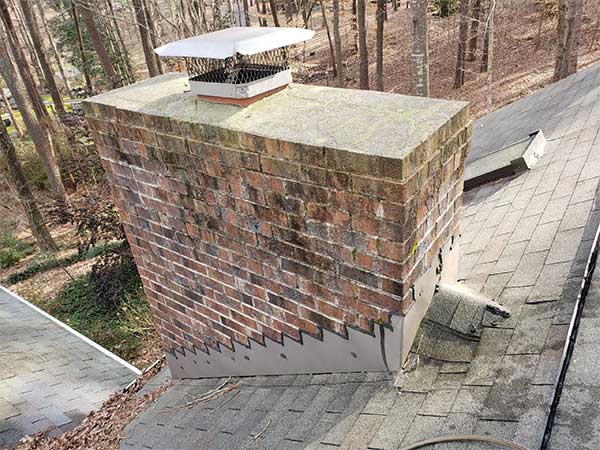
Before

After
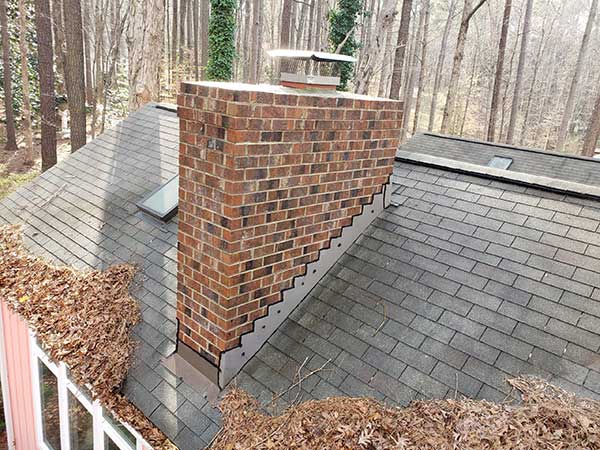
After
Can I Prevent Chimney Leaks?
If your chimney is leaking, we urge you to have a qualified chimney professional inspect it immediately. We cannot overstress how important this is. Water can quickly cause serious damage to the structure of your chimney, as well as surrounding areas of your home. And the longer this damage is allowed to continue, the more costly the repairs are likely to be.
Remember – water damage can be a slow process that largely goes unnoticed. In many cases, by the time you notice that there is a problem, there could already be serious – and expensive-to-address – damage.
There are several ways to protect yourself against chimney leaks:
- Schedule regular chimney inspections with a CSIA-certified chimney technician. They can identify and address problem areas before they turn into leaks and damage.
- Install flashing around the base of the chimney where it meets the roof. Quickly repair or replace the flashing if it’s damaged.
- Install a chimney cap to prevent rainwater, debris, and animals from entering the chimney flue – and make sure it’s fitted correctly.
- Make sure your chimney crown is intact. If you have a prefab chimney, a chase cover functions in a similar way.
- If the base of your chimney exceeds 30 inches in width, ask your chimney technician about installing a chimney cricket.
- Waterproof your chimney. It’s the simplest step in keeping your chimney water-free.
- Don’t take too long to schedule repairs. While some damages can wait a little while, we always recommend addressing them promptly.
- Look for damaged or spalling bricks. Deteriorated masonry is one of the most common signs of chimney damage.
Do You Provide Chimney Leak Repair Services Near Me?
For more than 16 years, Mr. Smokestack Chimney Service has repaired chimneys all over Broadway and Raleigh. We have clients who live in Wake County, Orange County, Lee County, Chatham County, Moore County, Harnett County, and Johnston County.
If you don’t see your county on this list, give us a call or reach out to us online. We may be able to travel to your area.

Let Mr. Smokestack Chimney Service Fix Your Leaky Chimney
Don’t let a leaky chimney get out of hand. The CSIA-certified professionals at Mr. Smokestack Chimney Service can inspect your chimney and track down the source of any leaks or water problems. You can schedule an appointment with us now by calling 919-747-1859 or contacting us online.
You don’t have to live with a leaky chimney and the headache that it causes – let us get to the bottom of the problem.
You might be surprised to learn that our professional chimney and vent services include dryer vent cleaning – we cover it all!
